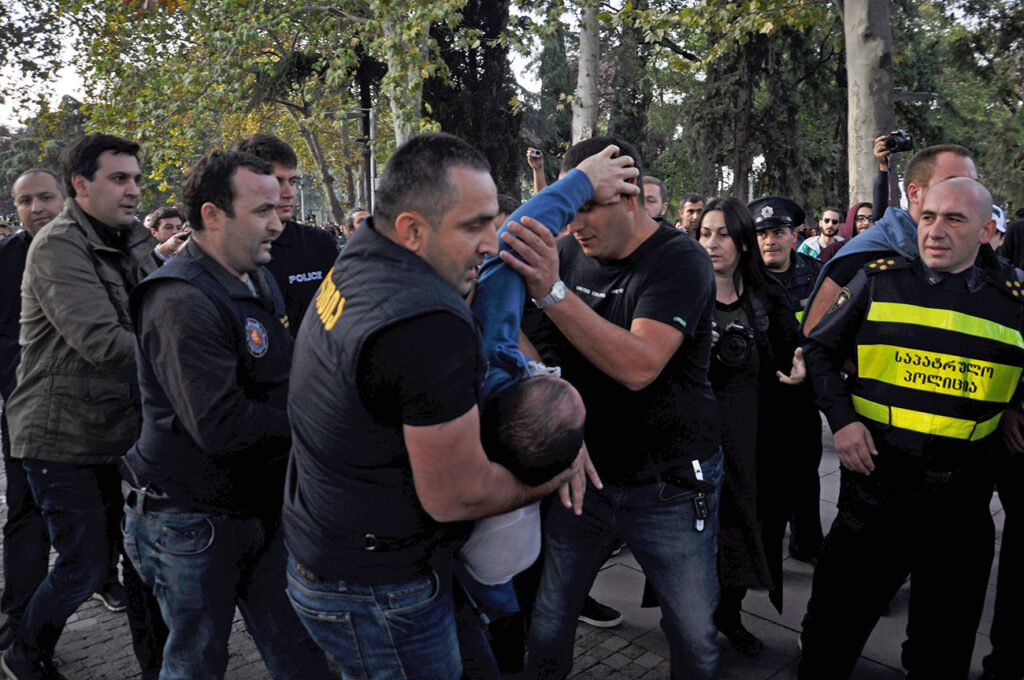Georgian MPs have passed legislative amendments mandating harsher fines and longer periods of pre-trial arrest for repeated administrative offences, something human rights watchdogs warn could have a chilling effect on freedom of expression and the right to peaceful assembly.
A number of human rights groups in Georgia, including Transparency International - Georgia, the Georgian Young Lawyers’ Association (GYLA) and the Democracy Research Institute (DRI) — have rebuked the Georgian Parliament for toughening laws on administrative offences in a series of expedited legislative hearings.
On 29 April, the Georgian Dream dominated parliament endorsed in its third and final reading amendments to the Code of Administrative Offences thereby introducing harsher penalties for petty hooliganism (Article 166) and disobeying the police (Article 173).
The package law voted in on Thursday tripled the minimum fine for repeated hooliganism to ₾1,500 ($440) and doubled the maximum fine to ₾2,000 ($580). In lieu of the fine, offenders may also be placed into administrative arrest, according to the amendments there will now be a 5 day minimum for administrative (pre-trial) arrest, the maximum is set to remain at 15 days.
Similarly, the lawmakers also toughened non-compliance with orders of a law-enforcement officer by increasing penalties to ₾3,500-₾4,500 ($1,000-$1,300) from ₾1,000-₾4,000 ($290-$1,200) — or at least 7 days of administrative arrest, the maximum, again, will remain at 15 days.
Additionally, the Parliament extended the maximum period of administrative detention for any reason (Article 247) from 24 to 48 hours.
Watchdog groups have expressed their concern over the amendments’ negative effect on the freedom of peaceful assembly, as the legal provisions targeted by the amendments are routinely used by police to detain participants of anti-government street protests.
The US Embassy: ‘deeply disappointed’
Critics have underlined that reviewing the draft law in an expedited fashion complicated the public oversight of the process, as well as endangering what has appeared to be rapprochement between the ruling Georgian Dream party and the country’s opposition.
In a statement released shortly after the amendments passed, the US Embassy to Georgia expressed their ‘deep disappointment’ over Georgian Dream streamlining the package law in such a manner, calling it ‘unnecessary and unhelpful’.
‘The lack of meaningful consultation with opposition parties, civil society and other stakeholders raises questions about the purpose of the amendments’, the statement reads.
The US Embassy, which had mediated the EU-led negotiations between the ruling party and opposition groups, resulting in the 19 April agreement, underlined that Georgian Dream have ‘fallen short’ of taking more inclusive steps after the deal.
In response to such criticism, Georgian Dream MP Dimitri Samkharadze blamed the lack of debate on opposition groups disregarding the parliamentary hearings on the law.
While criticising Georgian Dream over the latest move, several activist groups, including Movement for Georgia and Shetsvale (Change!) that have frequently held anti-government protest rallies, did not spare the opposition groups in the parliament from criticism for their 'astounding' silence on the matter.
On 27 April, In a bid to overcome the ‘political crisis’ in the country, MPs from Strategy Aghmashenebeli, Lelo, the Republican Party, Girchi — New Political Centre, and Girchi — More Freedom started participating in the parliamentary work. however, they mostly limited it to the amnesty law which is expected to free ‘political prisoner’ Nika Melia, chairman of the largest opposition group United National Movement.
[Read more on OC Media: Opposition split over EU-brokered deal to end crisis in Georgia]




 30 April 2021
30 April 2021



